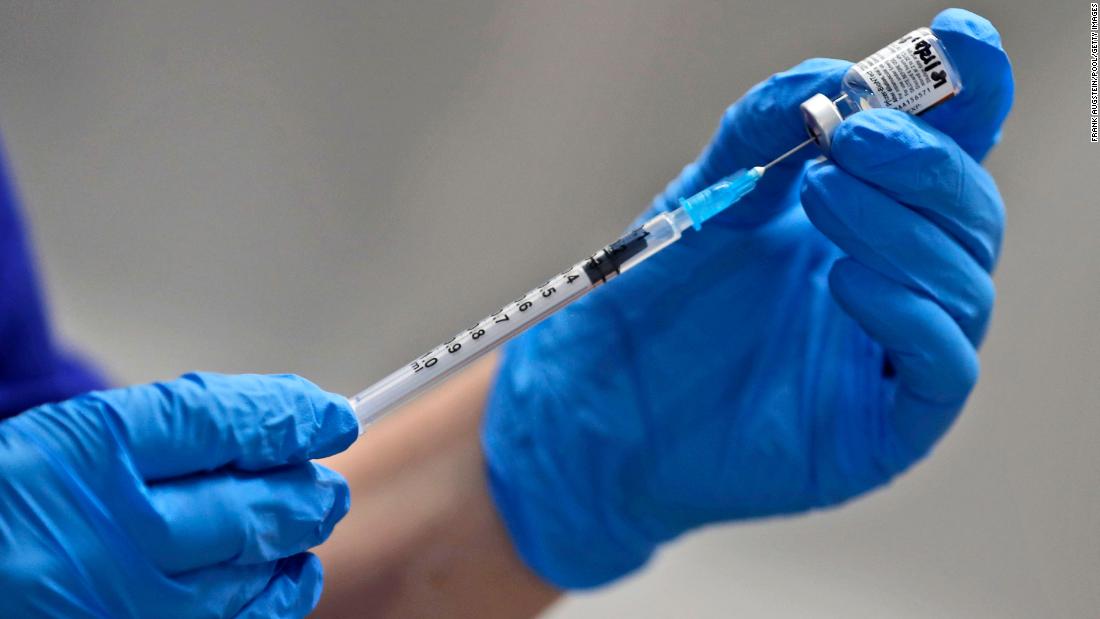The new strategy, announced Wednesday by the head of the UK’s MHRA, means that the interval between doses can be extended to 12 weeks, instead of the previously prescribed three weeks.
This sparked a debate among experts, with the British Medical Association (BMA), a body representing UK doctors, criticizing the move to postpone appointments for very high-risk patients who are currently awaiting their second shots.
The Pfizer / BioNTech vaccine has been in use in the UK since early December, when it became the first country in the world to have approved it, but supplies are limited.
The controversy over the vaccination strategy comes as infection rates are soaring in much of the UK, thanks in part to a new, more contagious type of virus. Most of England is now under the toughest level of restrictions to try to limit the spread of the virus.
„This group of elderly patients is at the greatest risk of dying if they contract Covid-19, which is why doctors are so concerned about them. It is grossly unfair to tens of thousands of our most at-risk patients to date,“ said Dr. Richard Futry, Chair of the General Practitioners Committee At BMA, in a statement on Thursday, „try to reschedule their appointments.“
The UK Medical Association also raised „real and serious concerns“ about the new vaccination strategy, warning on Friday that it could undermine the patient’s consent process in the National Health Service, „as well as a complete failure to follow science.“
Meanwhile, Pfizer said it does not have data to prove that just one dose of its vaccine will provide protection from the disease after more than 21 days.
„The third phase study conducted by Pfizer and BioNTech for the Covid-19 vaccine was designed to assess the safety and efficacy of the vaccine following a two-dose schedule separated by 21 days,“ Pfizer said in a statement on Thursday. „There are no data proving that protection after the first dose continues after 21 days.“
They said that „the second dose of the vaccine is likely to be very important during the protection period, and in an appropriate period of time, it may increase the effectiveness of the vaccine.“
„In the short term, the further increase in vaccine efficacy from the second dose is likely to be modest; the vast majority of primary protection against clinical disease is after the first dose of the vaccine.“
A „terrible effect“ on emotional well-being
In its statement, the Bahrain Monetary Office warned that the delay could have a „terrible impact on the emotional health“ of patients at risk and at risk.
„BMA believes these are the patients the NHS and local doctors have already promised to receive a second dose of Pfizer vaccine next week; they have agreed to receive it and, rightly so, expect to get the PMA said.“
Votry, president of BMA, told CNN Friday that healthcare professionals were particularly concerned about „the practicality of doing it quickly,“ with little warning to practitioners about the revised guidelines.
„We were only informed on the last day that it is expected, next Monday, that we will change all the appointments that we have made for the next week … It was simply not practical for our training staff to do so in such a short period of time.“ Futry said.
„We wanted the commitments we made to our elderly patients to honor their vaccine, and for sure in the next few days.“
Helen Salisbury, Oxford GP, told the BBC’s Today program on Friday that her practice has not yet taken place. Cancel the second existing appointments next week. This was because, first, it was unable to find any data on immunity after the first dose 21 days later when the booster was administered in the trials, and secondly, because the practice wanted to protect the most vulnerable patients, the elderly, and maintain their confidence in the vaccine.
„When you start a patient on a course of treatment and say, This is the plan, here’s one blow, please come back in three weeks, it’s really important to have a second injection to be fully protected – and then you turn around after five minutes and say no, don’t worry about That, you can have it in 12 weeks instead of three – I don’t think that’s good enough, in fact, „she said.
The medical officials said in their letter that they were aware of the operational difficulties and potential distress involved in rescheduling second appointments in a short time.
„ However, we are all aware that for every 1,000 people who were boosted with a second dose of Covid-19 vaccine in January (and who as a result would marginally gain protection from severe disease), 1,000 new people would not be able to obtain much primary protection from Likely in most cases to be raised from 0% protected to at least 70% protected. „
Pfizer said it did not evaluate the different dose schedules because „the majority of trial participants received the second dose in the window specified in the study design.“
In its open letter, the UK Medical Association wrote: „The protection afforded by the first dose of Pfizer is 52.4% less, compared to 95% if two doses were given three weeks apart.“
Futuri told CNN that greater assurances will be needed from both the UK’s top medical officials and Pfizer in order to give healthcare professionals and patients confidence in the government’s strategy.
„We need Pfizer itself to be confident that this new dosing regimen will provide effective coverage and protection for our patients, especially the most vulnerable patients,“ Futry said.
British regulators have also advised that a second dose of the newly approved Oxford / AstraZeneca be given, which is scheduled to be released from Monday, after four to 12 weeks.
The US is also considering punch spacing
National Institute of Allergy and Infectious Diseases director Anthony Fauci said Thursday that a strategy to extend the period between first and second vaccine doses is „under study“ in the United States.
So far, two vaccines have been approved for use in the United States, the Pfizer / BioNTech vaccine and the other by Moderna, which requires a second dose after 28 days.
„I still think if it’s done right, you can do one dose, keep shots for the second dose, and still get the job done,“ said Fauci on the Today Show on NBC, but there is a lot of debate about whether you want to spread the vaccination. The first is by vaccinating more people in the first round. „
Fauci said it could be discussed either way, but the potential problem would be if the person did not get the second dose in time and there was a delay.
He said it was known from clinical trials that „the optimum time is to give it in one day, then for our manager after 28 days and for Pfizer after 21 days, that’s what the data tells us is the best way to do it.“
If you want to stick to the data, that’s how it should be done, he said, “But you can make an argument, and some people, about extending doses by giving one dose across the board and I hope you get the second dose in time to give it.” For individuals. „
British Prime Minister Boris Johnson made an optimistic note about vaccines in his New Year’s Eve speech.
„We still have an arduous struggle for weeks and months, because we are facing a new type of disease that requires a new vigilance,“ he said.
“But as the sun rises tomorrow in 2021, we have the certainty of those vaccines. And I think 2021 is, above all, the year when we will end up going with these everyday things that now seem lost in the past, bathed in a pink glow of nostalgia. The past – going to bars, concerts, theaters, restaurants, or just catching loved ones in the normal way. „
CNN’s Nyam Kennedy and Vasco Cotovio contributed to this report.

Přátelský webový obhájce. Odborník na popkulturu. Bacon ninja. Tvrdý twitterový učenec.


